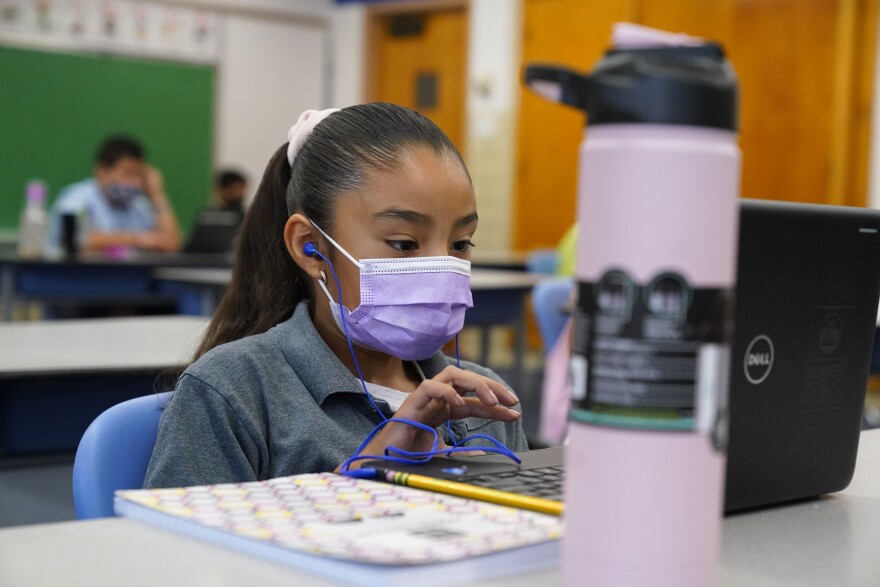Many educators across Maine continue to absorb the stress of a school year that’s been unlike any other.
In a public letter released Tuesday, seven teachers’ unions from across western Maine say that teachers are working long, unsustainable hours and are struggling to balance remote, hybrid and in-person learning.
The teachers are calling for districts and the state to give them more planning time, provide extra staff to teach remote students, reduce testing and include educators in planning conversations moving forward.
Alison Litton, president of the Lewiston Education Association, spoke with All Things Considered host Robbie Feinberg about the letter.
This interview has been edited for clarity.
Feinberg: Can you explain how this letter came about? Litton: As a supportive measure, we meet regularly and discuss what’s going on in our local areas and then what we can do to support each other. The last few meetings, we’ve been discussing that some areas are definitely being more proactive and responsive to teachers’ concerns, to educators’ concerns, but other areas are having a hard time with that. So we felt we should take a stance together, and really just stand shoulder to shoulder with it and say, ‘These are the concerns that we are having in our public schools here in Maine. And you know, something’s gotta give.’ So in your letter, I think you list eight demands that you say should be required of schools right now to help improve things for both students and teachers. They include more time for planning, more autonomy for teachers, adequate PPE and more things beyond that. But school officials have told me in recent months that they’ve been trying to work with teachers on several of the issues and support them. In general, do you feel like districts have been listening to teachers on these issues so far? I think to some extent. Here in Lewiston, we’ve been quite fortunate. We’ve had a good working relationship with the school committee and they have been, within their constraints, proactive. PPE is not a concern here in Lewiston, but in other districts it is. A lot of the times the response for things that can’t be dealt with is either a monetary constraint, or it’s a constraint from the Maine Department of Education saying that these are things that are not to be bent, right? There’s no flexibility in them for this year. The pieces that we’ve run into in the last few months that we have been back, we’re talking about pacing guides that are set by the state, and there isn’t any flexibility to say, ‘Some of these kids missed three months of instruction.’ At the end of last year, there was no summer school the way that it typically is managed. So many children that would have received an extended year or would receive some remediation during the summer didn’t get that either. So at this point, we need to meet the kids where they’re at. School officials have told me that while many districts are working to add staff and find more time for teachers if they can, they say they’re often hamstrung by the budget constraints, and specifically the lack of additional federal funds that hasn’t come down yet for schools. How do you think we solve some of these problems when there are those kind of constraints and limits right now? The CARES Act funding was absolutely helpful, the way that the state handled it and allowed locals to make those decisions on how it was spent. But there were a lot of constraints on how that money was used. And just in general, we have here in Lewiston I believe it’s 78 openings for ed techs, and we can’t fill those. Those are budgeted, but we can’t fill them. So we have services that either aren’t supported or at times are not being adequately rendered because we have no applicants, or we don’t have the quality of applicants that we’re looking for. So I think a shortage in educators — the majority of our certified positions are filled, but we’re looking for speech therapists, we’re looking for a multitude of ed techs and in different roles, and that’s just not being filled. Why was this letter released right now, right before Thanksgiving break? We we felt it was important to be proactive, and also just to give some time — many school committees are going to be meeting the Monday after. So just to kind of kind of give this air, allow time that we’re not dedicated to teaching to be able to discuss these matters, and truly have a good dialogue before we come right back to being responsible for our students.
Maine Public reached out to multiple superintendents in Western Maine, but they were either unavailable or didn't return requests for comments.
Steve Bailey, the executive director of the Maine School Management Association, says he was surprised by the letter. He says schools and teachers have been working hand-in-hand in many districts to support both students and educators. And Bailey says that statewide, he's seen many examples of districts reducing class sizes, adding more teachers to assist with remote learning, and adding early release days or even shortening school days to give teachers more time to plan.
"I do know that they have had challenges, though, in terms of trying to find ed techs to be able to fill some of the support staff positions. But they are in the plan. And they are trying to do that to make sure that support is there for students, as well as for staff," he says.
Bailey says many administrators are also hoping that the federal government can pass more coronavirus relief, since funds from the stimulus bill passed earlier this year expire at the end of this month.
For disclosure, most of Maine Public's news staff is represented by the Maine Education Association.




